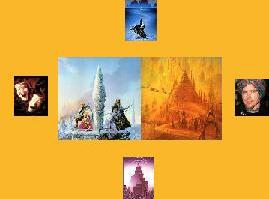
Otherland
He was tossed, fragmented, part of the outward-collapsing whirl of shattered light. His own identity was gone—he was spun into pieces like a universe being born.
"You're killing him!" his angel had cried as she herself flew apart into a million separate ghosts, each one shimmering with its own individual light—a shrieking flock of tiny rainbows. . . .
But as the world collapsed, a piece of his past returned to him. It came first as a single visionary flash—a house surrounded by gardens, the gardens themselves bounded by a wild forest. The sky was patchy with dark clouds, brilliant streaks of sunshine falling between them, the grass and leaves beaded with the recent rain. Light dazzled in the drops of water and fragmented into gleams of many colors so that the trees seemed part of a fairy-garden, a magical wood from a childhood tale. During that fraction of an instant before the memory grew wider and deeper he could imagine no more peaceful a haven.
But it was all, of course, far stranger than that.
-Tad Williams, Sea of Silver Light
Tad Williams' second epic Otherland departs from the realm of fantasy for science fiction. All of Williams' works up to that point had been in fantasy, so many were surprised when he announced his decision to write the mammoth Otherland epic. Roughly 3300 pages in length over four books, it weighs in the same length as Memory, Sorrow, and Thorn.
Although he had up to that point written fantasy, Williams had the background to write this epic. The inspiration came to him while working as part of a team in interactive television, which was approaching something like virtual reality. When asked, Williams says that he thinks the internet will eventually become a virtual reality construction, just like his novel. Otherland is staged in the near future, where breakthroughs in computing and virtual reality have allowed people to be a barbarian facing fantastic monsters in role-playing programs, shop in virtual malls, and other wonders.
A group of elite, rich businessmen and women named the Grail Brotherhood have started up their own network, called Otherland. Using incredible amounts of computing power, they have managed to create a world so realistic it's indistinguishable from reality. This clever idea allows Williams to do pretty much anything he wants within the narrative. In the space of the first novel, the reader follows the characters through Alice's Wonderland, World War One, a land of giant insects, and an ancient Egyptian afterlife, to name a few. This richness in setting allows Williams to bring his skills with fantasy to play, to wonderful effect.
The same care and attention to characters that makes Memory, Sorrow, and Thorn such an interesting story continues in Otherland. There are more characters in Otherland, each interesting individuals in their own right. Renie Sulaweyo--arguably the hero of the story--is a woman whose devotion to family leads her to Otherland. Her little brother mistakenly gets sucked into Otherland, putting him into a coma-like state. She meets up with !Xabbu, a bushman who shows a natural skill in virtual reality. The reader also follows Paul Jones, who has amnesia and mistakes the World War One Otherland for reality. Orlando brings in the teenage element of this alternate reality. He has a rare degenerative disease that cripples him in the real world. So he plays Thargor, a super-strong barbarian in online role-playing games.
In addition to many main characters, Williams pursues multiple plotlines at once, weaving them expertly until the characters come together. However, for many readers, the sheer number of plots and main characters bog down the narrative. Williams' love for complex plots and characters seems to earn him scorn and devotion in equal parts.
Otherland was six years in the making, and if readers complain about the length, it's interesting to keep in mind that Tad Williams read the last book Sea of Silver Light, which is 1100 pages, six times in the space of four months while editing. His attention to detail pays off; the result is an epic equally as rich in complexity and imagination as Memory, Sorrow, and Thorn.